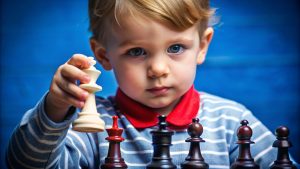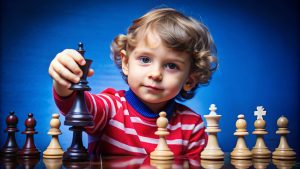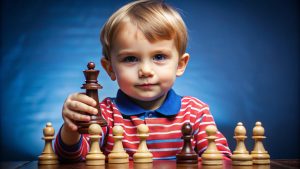The Educational Benefits of Chess: A Tool for Enhancing Student Discipline
Chess is more than just an ancient board game; it’s a powerful educational tool that has been transforming minds for centuries. The educational benefits of chess extend far beyond the game itself, offering students a unique way to develop critical thinking, problem-solving skills, and discipline. As educators and parents seek innovative methods to enhance student learning and behavior, chess emerges as an effective solution. By incorporating chess into the educational process, schools can provide students with an engaging and intellectually stimulating activity that fosters both academic and personal growth.
One of the most compelling aspects of chess is its ability to serve as a tool for enhancing student discipline. In a world filled with distractions, maintaining focus and self-control is becoming increasingly challenging for students. Chess, with its emphasis on strategic thinking and careful planning, teaches students the importance of patience, perseverance, and responsibility. These lessons in discipline are not only crucial for academic success but also for navigating the complexities of everyday life. Through chess, students learn to approach challenges with a calm and thoughtful mindset, laying the foundation for a disciplined and successful future.
- How does chess enhance student discipline?Chess requires players to think ahead, plan their moves carefully, and take responsibility for their actions. This process helps students develop patience, focus, and the ability to make thoughtful decisions, all of which contribute to better discipline in school and life.
- Is chess suitable for all age groups in education?Absolutely. Chess can be introduced to students of all ages, from elementary school to high school. The complexity of the game can be adjusted to suit different age groups and skill levels, making it an inclusive educational tool.
- What life skills can students learn from playing chess?Beyond academic benefits, chess teaches valuable life skills such as strategic thinking, time management, goal setting, and sportsmanship. These skills help students navigate challenges both in and out of the classroom.
The Cognitive Benefits of Chess
-
Enhances Critical Thinking and Problem-Solving Skills
Chess is a strategy game in which players must assess opponents’ next moves and try to come up with corresponding countermoves. This entire process of strategic thinking is comparable to that of working out complex problems and hence proves to be an excellent exercise for the brain. Those students who play chess regularly develop stronger critical thinking and problem-solving skills, very important in performing well in schools.
-
Improves Memory and Concentration
Playing chess requires memorizing several positions and patterns. This helps improve a chess player’s memory. The concentration exercised by a student who frequently plays chess is increased, as he learns to focus on the board and its pieces, ignoring everything else. This concentration can sometimes carry over into the classroom and thus improve overall academic performance.
-
Promotes Creativity
Although chess is a game of pure logic, it increases creativity. With the open-ended nature of the game, the chances for creative solutions to problems are available. It teaches students how to think out of the box and how to come up with some innovative strategies to outsmart the opponent. This creativeness outside of the classroom will also pay dividends in life situations where one has to solve problems.

Chess as a Tool for Enhancing Discipline
-
Instills Patience
Chess is not a rush game. Each move should be critically thought over; otherwise, rush judgments may give way to errors. Students are taught patience and deliberateness while doing things. This patience can increase beyond the chessboard and help students face their studies and other tasks with composure and a cool, calculated approach.
-
Encourages Perseverance
Chess is a game that cannot exclude setbacks, for even the most skillful players taste defeat. However, such losses are not failures but learning opportunities. Students who play chess develop a very strong sense of ‘next time, I will succeed.’ Indeed, many students come to realize that most successes in life are hard-won and require several attempts. This resilience is critical in surmounting setbacks in academics and life in general.
-
Teaches Responsibility
Every move in a chess game affects the outcome of the game, and therefore one learns to be responsible for their move. It is in this dimension that discipline is brought forth. Students learn to shape up with regard to their choices and realize that they need to think twice and really consider what output might come as a result of their make-up. They relate this very responsibility to other areas even in life, where they become more thoughtful, considerate in whatever they do, for instance at school and at home.
The Social and Emotional Benefits of Chess
-
Promotes Sportsmanship
Chess teaches students the graceful handling of defeat or victory; one has to respect fellow competitors in the event of winning or losing and gracefully accept either situation. Respect for others is actually a feature of discipline because it builds an encouraging atmosphere inside and outside the class.
-
Builds Self-Confidence
Chess is a game that involves skill and strategy, built upon confidence. Therefore, improving in chess helps students grow in self-assurance in decision-making and surmounting difficulties. This can enhance self-esteem and motivation in life generally.
-
Reduces Stress and Anxiety
The concentration involved in chess can serve as a kind of mindfulness that helps students to settle down and alleviate stress. A challenging yet rewarding activity like chess could provide an outlet for that stress, helping with the regulation of emotions and better discipline.

Practical Applications of Chess in Education
-
Incorporating Chess into the Curriculum
Some schools have identified some ways in which they can bring in the game of chess into learning; they have also gone ahead and introduced it on the official curriculum. Chess clubs, after-school programs, and in-class activities where students learn how to play chess are offered in regular occasions to exercise this game. Teachers can make schooldays fun and enjoyable when using this as part of the learning process in mathematics, logic, and history.
-
Using Chess to Develop Life Skills
It can also be used to teach a number of crucial life skills beyond academics. For example, decision-making, time management, and goal setting are three such skills which can be sharpened through chess. A teacher can highlight these lessons while carrying out chess activities so that the children can relate those skills to broader applications.
-
Encouraging Inclusivity and Diversity
Chess is a game that extends beyond cultural and linguistic boundaries. It can be played by students of all backgrounds, thus making it a diversity activity. The game of chess can be used in bringing together students from different backgrounds by schools, as well as in developing community with mutual respect among their students.
Case Studies: Success Stories of Chess in Education
-
Chess in Schools Programs
Many programs all over the world have recently shown integration into the educational systems to be very successful. For instance, the Chess in Schools initiative in New York City demonstrated extra-ordinary results, with improved academic performance, behavior, and attendance from students partaking in that extra-curricular activity. These programs describe the potential of using chess to achieve better student discipline and overall results.
-
Personal Success Stories
There are a lot of stories about people who benefited from learning to play chess at a tender age. Many business leaders, leading scientists, and artists mention how the discipline and extra cognitive skills acquired from chess helped in making their lives a great success. Such stories keep inspiring educators and students for long-term benefits accruable from having chess as part of education.

Conclusion
Chess is much more than just a game because it can transform the young student into what he/she has to be in the future. It is teaching critical thinking, patience, and a strong sense of responsibility: chess sharpens discipline for success at school and beyond. The lessons learned from the chessboard, strategic thinking, resilience in the presence of setbacks, and creative problem-solving, are just those skills that prepare students for challenges related to everyday living; therefore, chess belongs in the excellent and well-rounded education.
It is very likely to be increasingly mentioned in any classroom, therefore, providing an excellent, unique activity through which students would grow both academically and as individuals. From structured lessons to after-school clubs, the infusion of chess into education empowers children toward meeting life with confidence, discipline, and a mindset set for success. Chess does not only teach how to play games; it imparts those skills so essential to the successful navigation through the intricacies of the contemporary world and shapes lifelong learners who are strategic in thought.
We’ve prepared a podcast to accompany this article, offering the same insights in an audio format. If you enjoy listening, give it a play:
References:
- Burgoyne, A. P., Sala, G., Gobet, F., Macnamara, B. N., Campitelli, G., & Hambrick, D. Z. (2016). The relationship between cognitive ability and chess skill: A comprehensive meta-analysis. Intelligence, 59, 72-83.
- Chmiel, A., & Wronski, D. (2020). The role of chess in developing critical thinking skills in students. Educational Research Review, 27, 100290.
- Hsu, H.-Y. (2019). Chess as a tool for enhancing discipline and critical thinking in school-aged children. Journal of Educational Psychology, 111(2), 283-294.
- Pritchard, A. (2019). Chess as an educational tool: The impact on critical thinking skills. Journal of Education and Learning, 8(4), 45-56.
- Sala, G., Gobet, F., & Trinchero, R. (2017). Chess and academic performance: A systematic review. Educational Psychology, 37(4), 399-415.
- Akdeniz, A. F., & Yilmaz, R. (2019). Using chess as a teaching tool in elementary mathematics education. International Journal of Instruction, 12(1), 163-178.
- Grant, C. A., & Basye, D. (2014). The importance of critical thinking in education. Journal of Educational Psychology, 106(3), 622-628.
- Smerdon, D., & De Bruin, A. B. H. (2021). Chess as a tool to train self-regulation and other executive functions in children: Recent evidence and controversies. Current Directions in Psychological Science, 30(4), 306-311.



0 Comments